A cover letter is an important document that provides the reader with a first impression of your skillset to help them decide if your resume merits an interview. Like resumes, cover letters should be tailored to the specific employer and the position you are applying for. If you recently graduated from college or university with no prior work experience, you must learn to write an appealing cover letter for an entry-level position.
This article will discuss a cover letter for this position in terms of the procedure to write it effectively using essential tips, which will help you stand out among others.
What is an Entry-Level cover letter?
An entry-level cover letter is a document sent to potential employers in conjunction with a resume while applying for such positions. A cover letter aims to introduce you to the employer and highlight your motivations for pursuing a career in the field you are applying for. It is also designed to convince the employer that you are qualified for the position, despite your lack of professional work experience.
Sometimes, employers may hire students but expect them to gain some experience in the field before advancing to more challenging positions. Thus, you must write your cover letter to convince the employer that you can fulfill the job’s responsibilities despite your limited experience.
Learn before writing
A poorly written cover letter will not do you any favors, and you may miss a lucrative job opportunity that might not be available again easily. Therefore, you must pay close attention to how you craft your cover letter to ensure that it achieves its desired impact on the given employer.
This means writing a cover letter that complements your resume rather than one that restates what is already in it.
As with any other type of writing, a cover letter is also an opportunity for you to showcase your communication and writing skills. Use it to tell a compelling story of your motivation and strengths as an applicant. Taking the time to write an appealing cover letter demonstrates your professionalism. It informs the employer that you are conversant with how things are done in a professional environment.
Free Cover Letter Templates
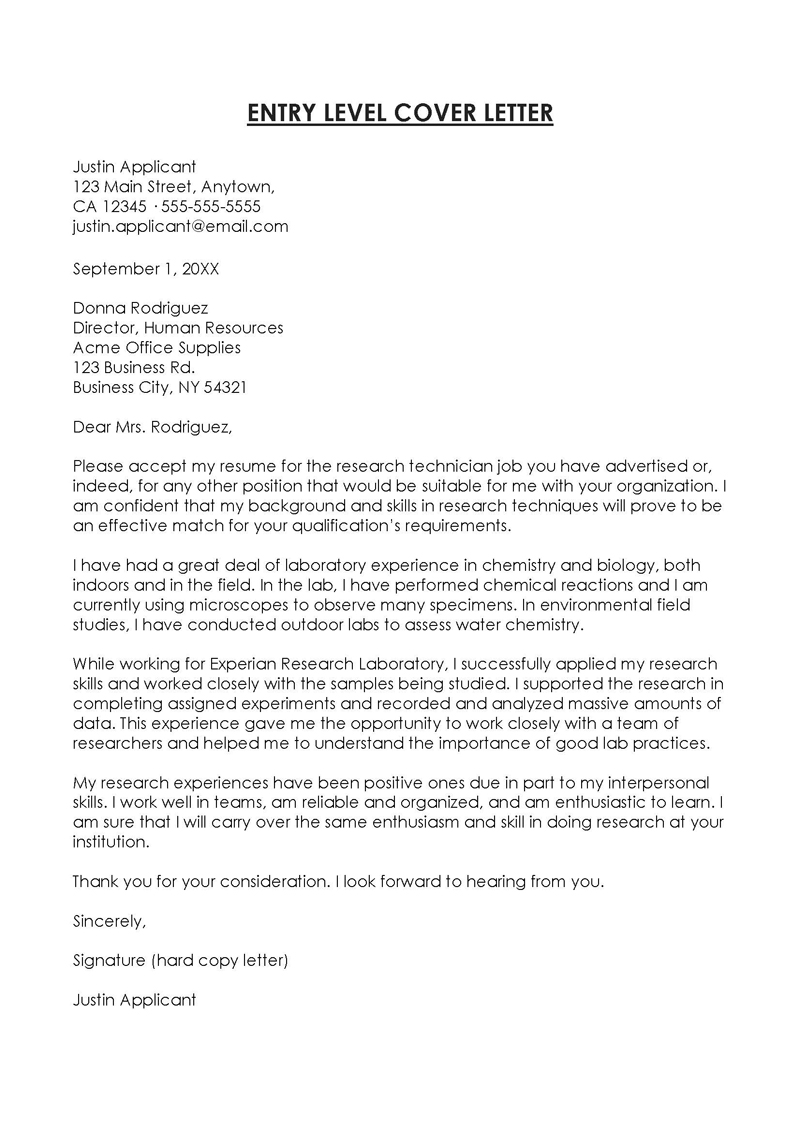
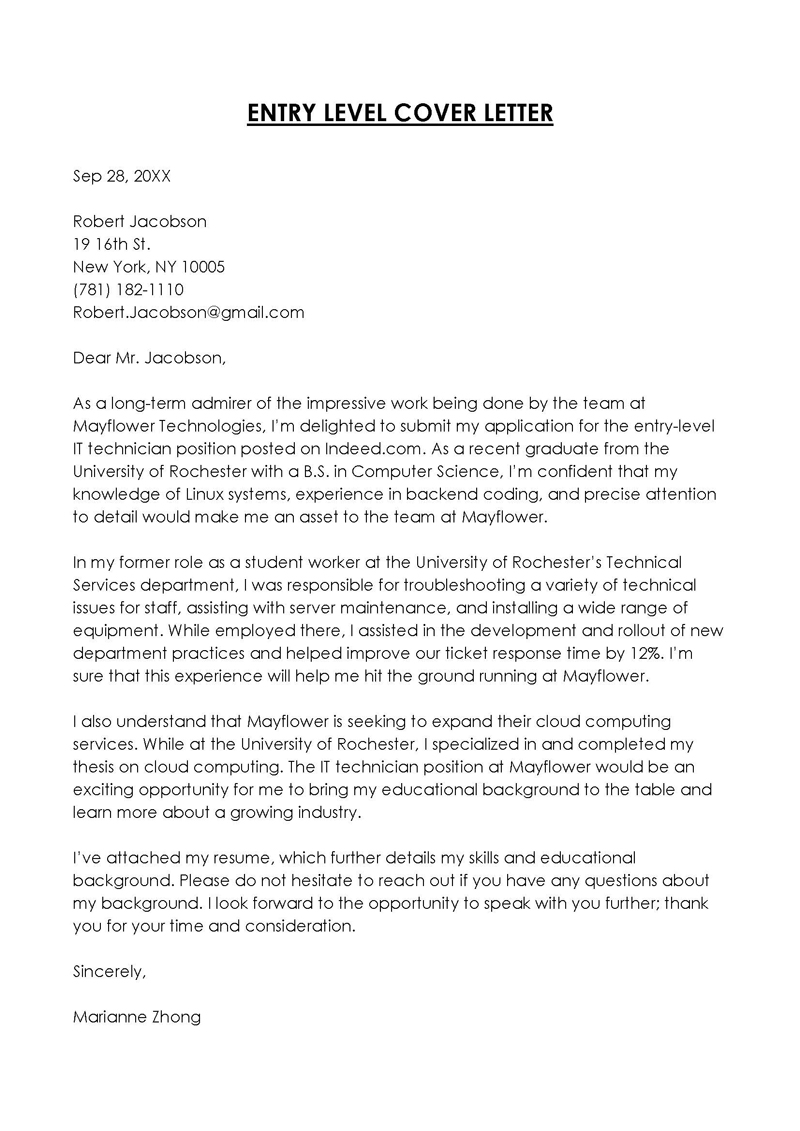
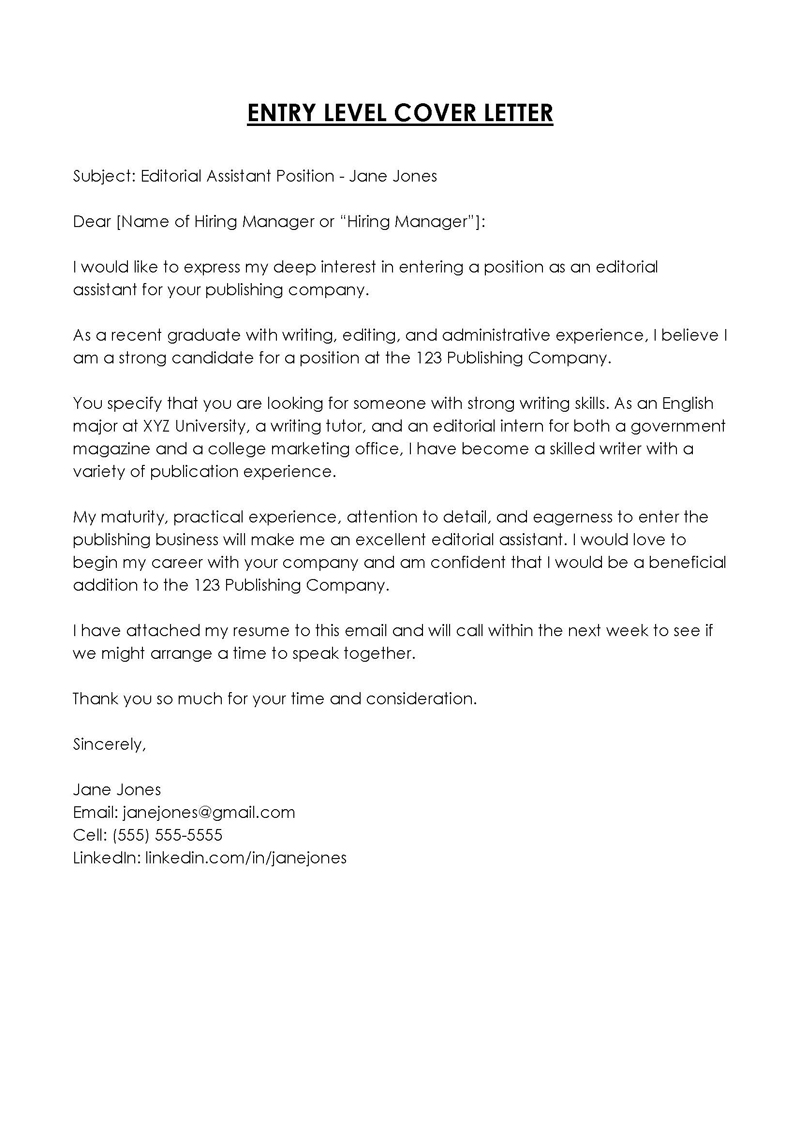
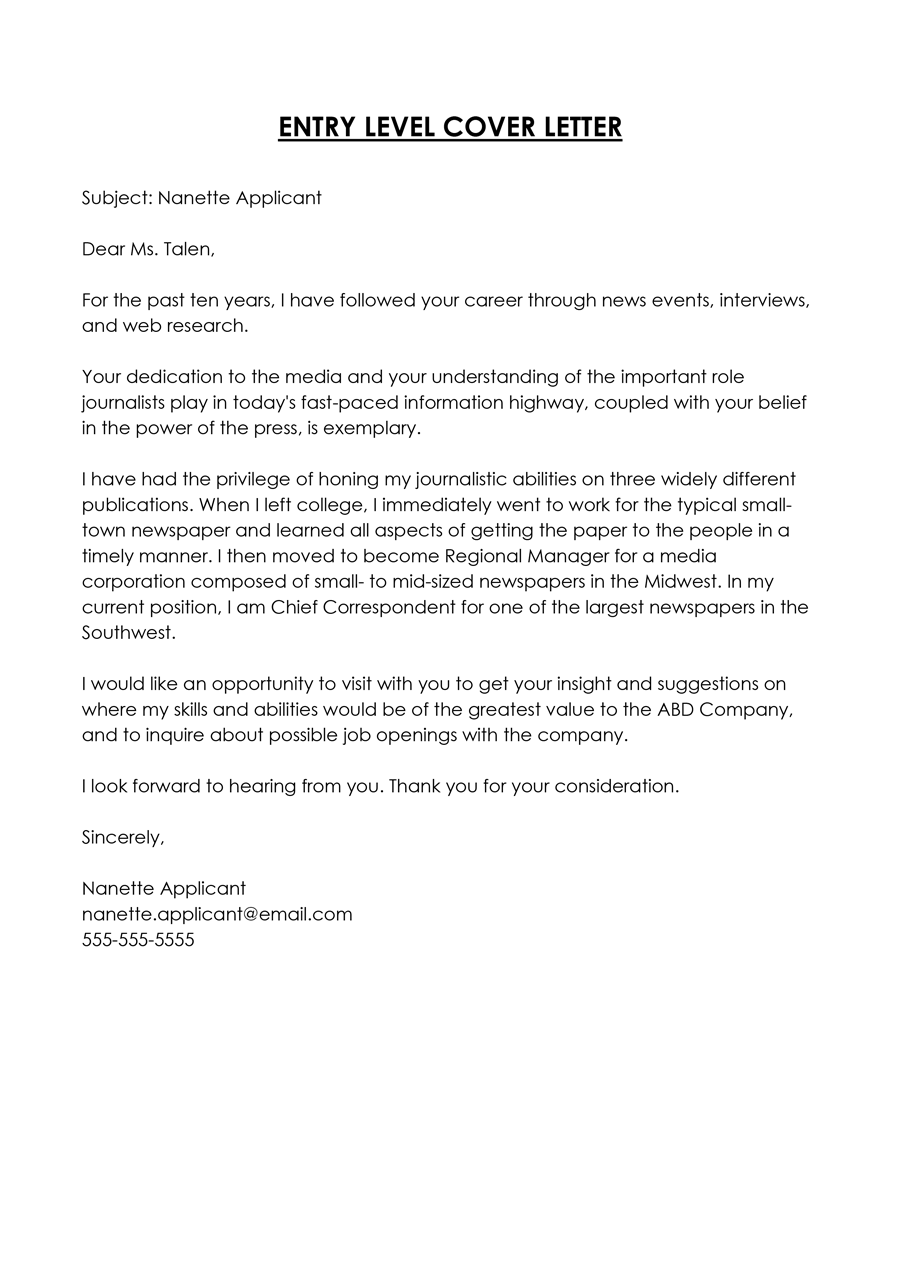
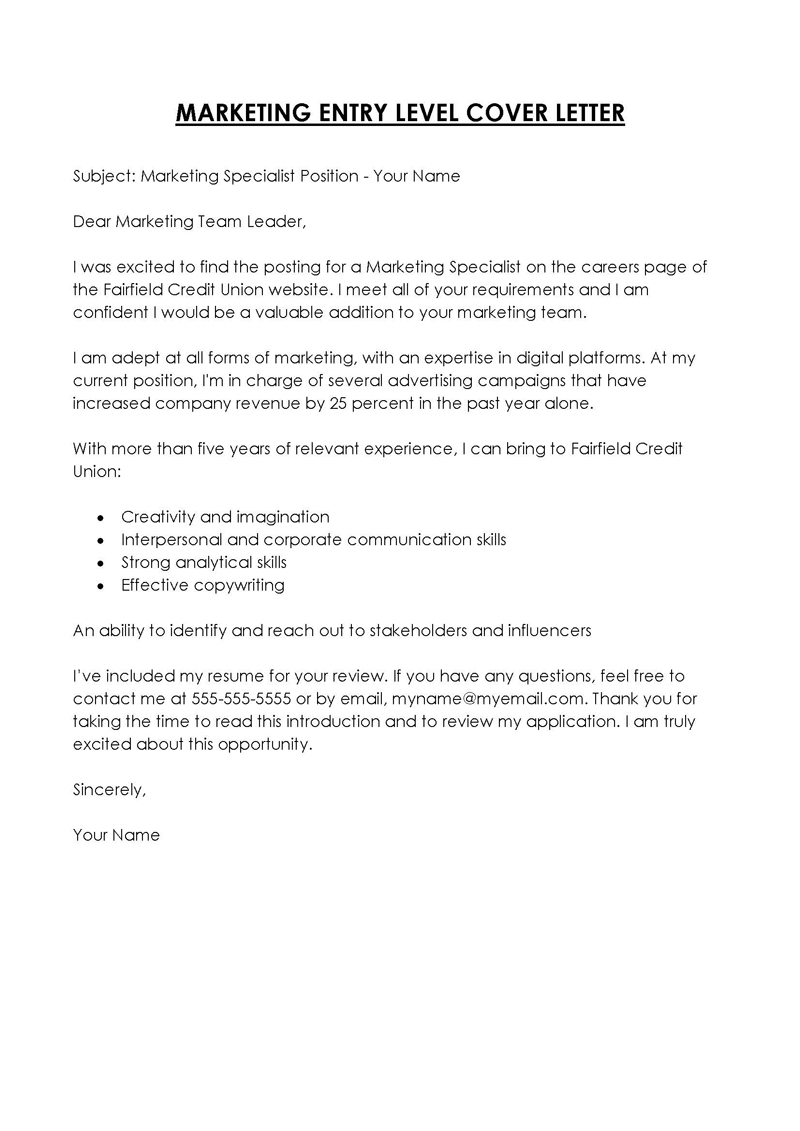
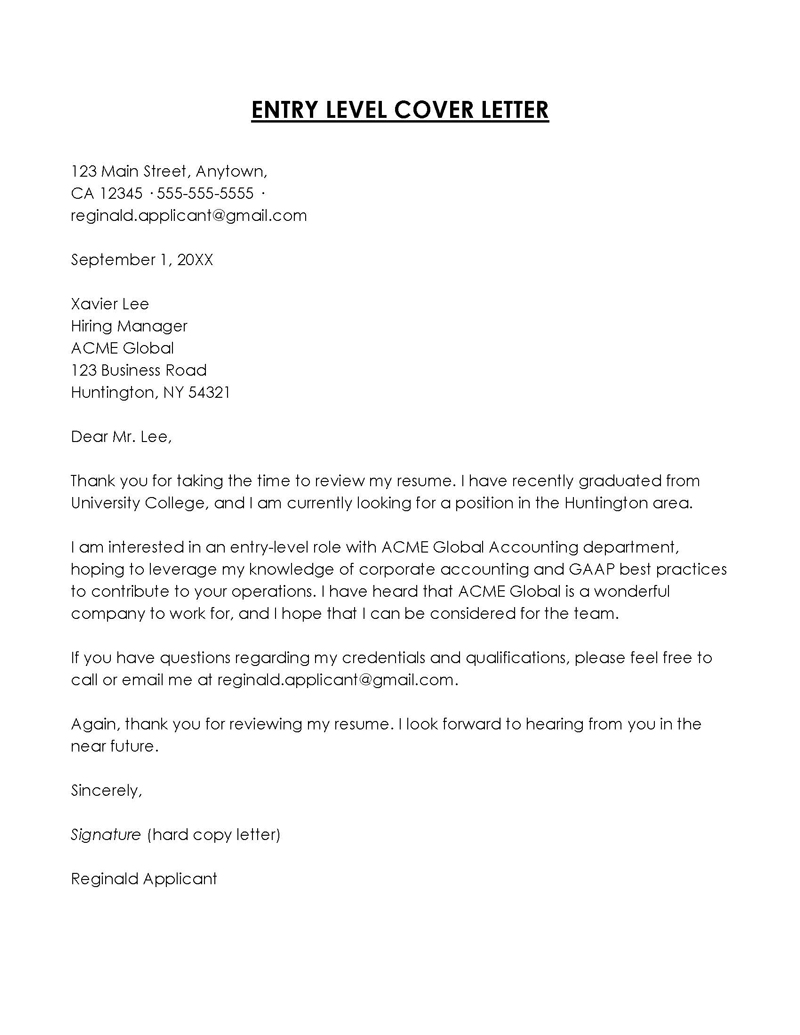
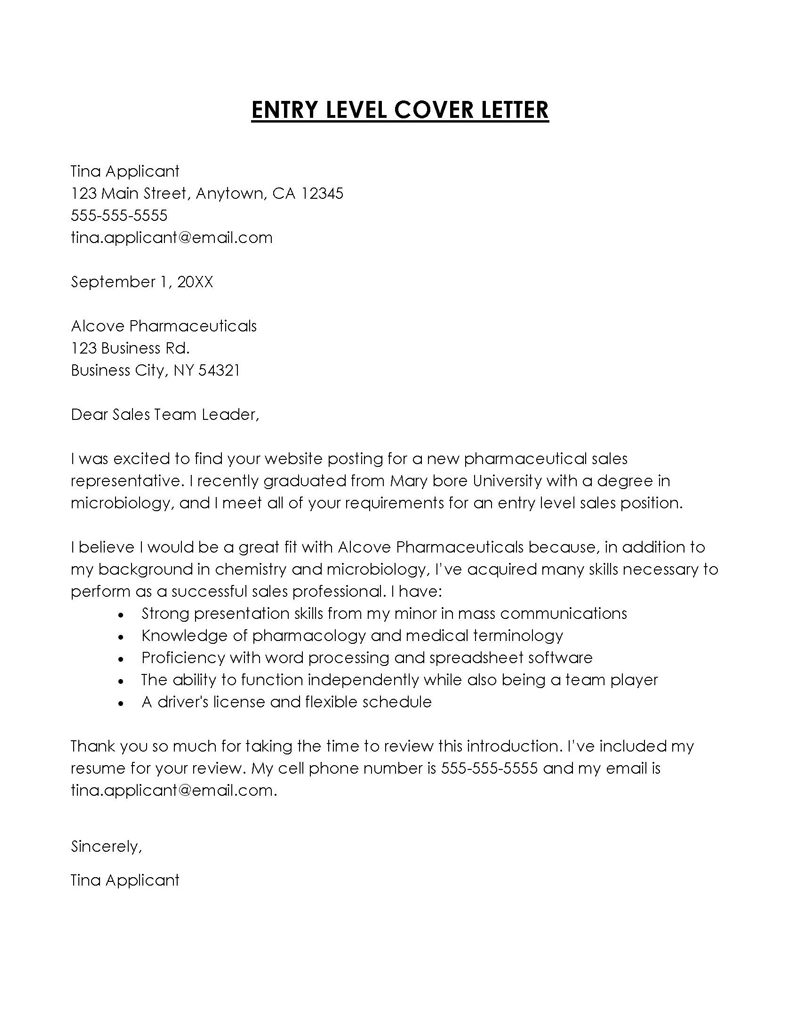
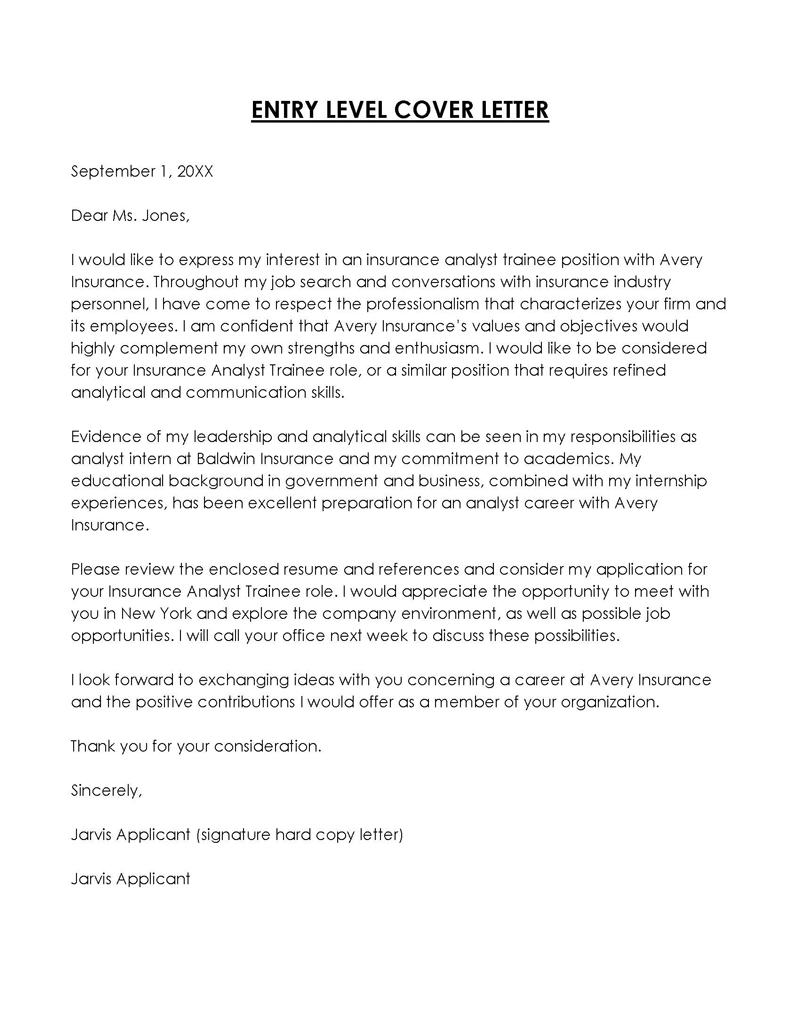
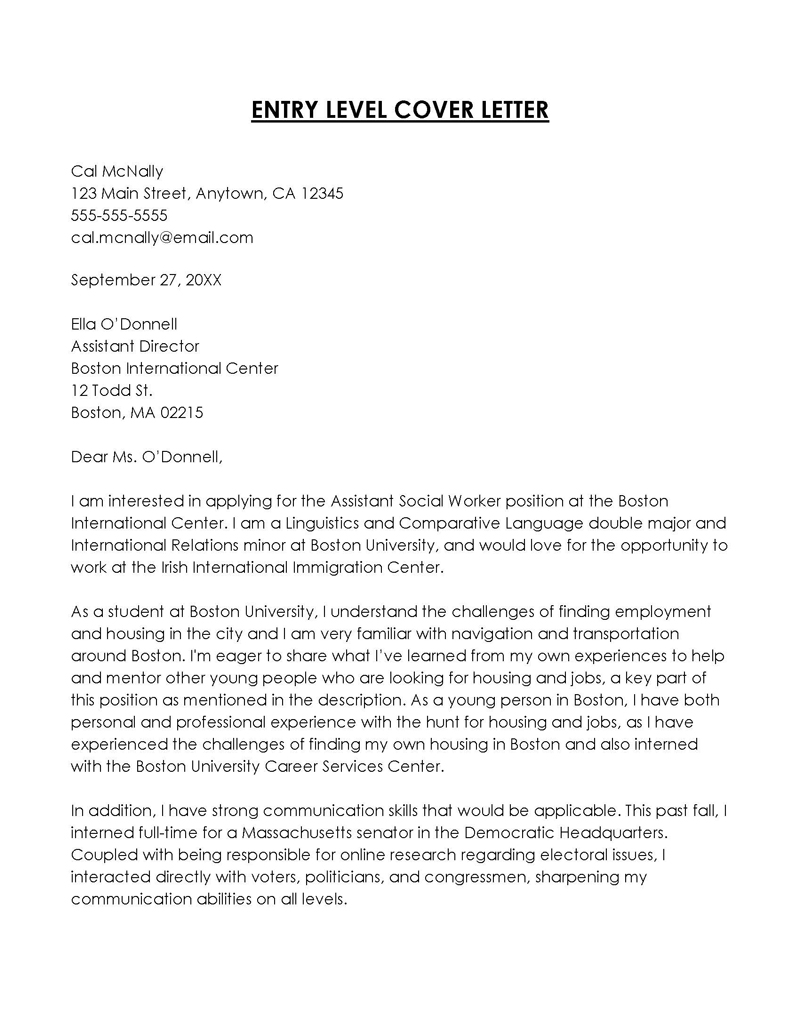
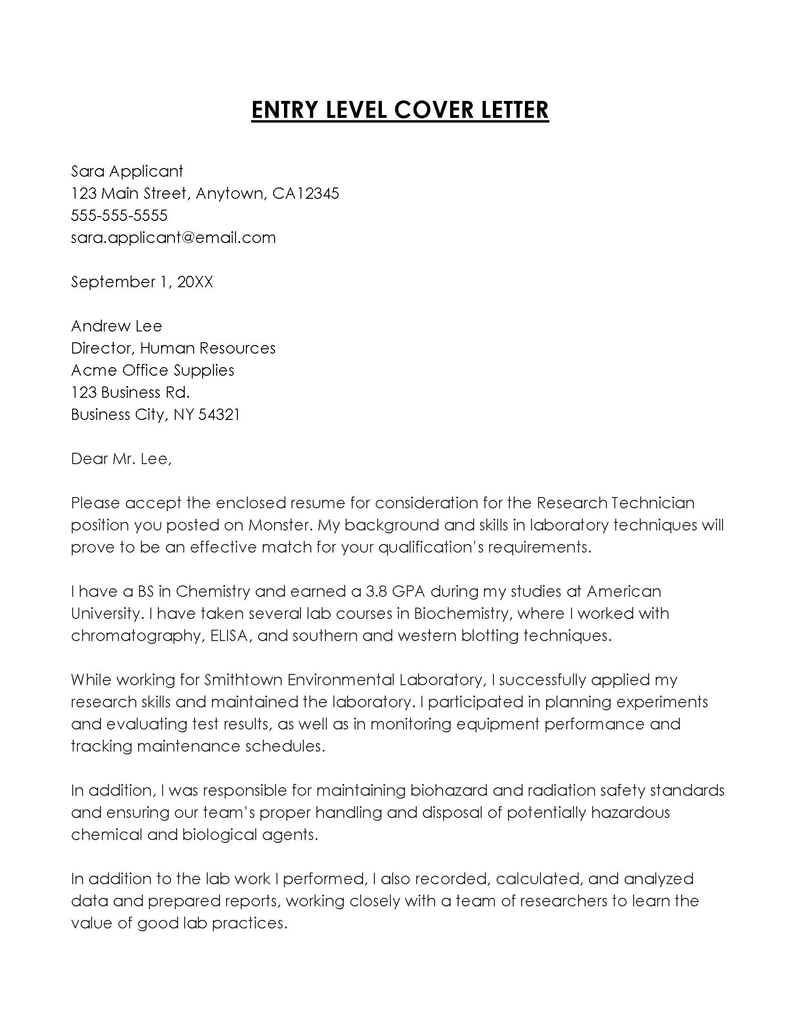
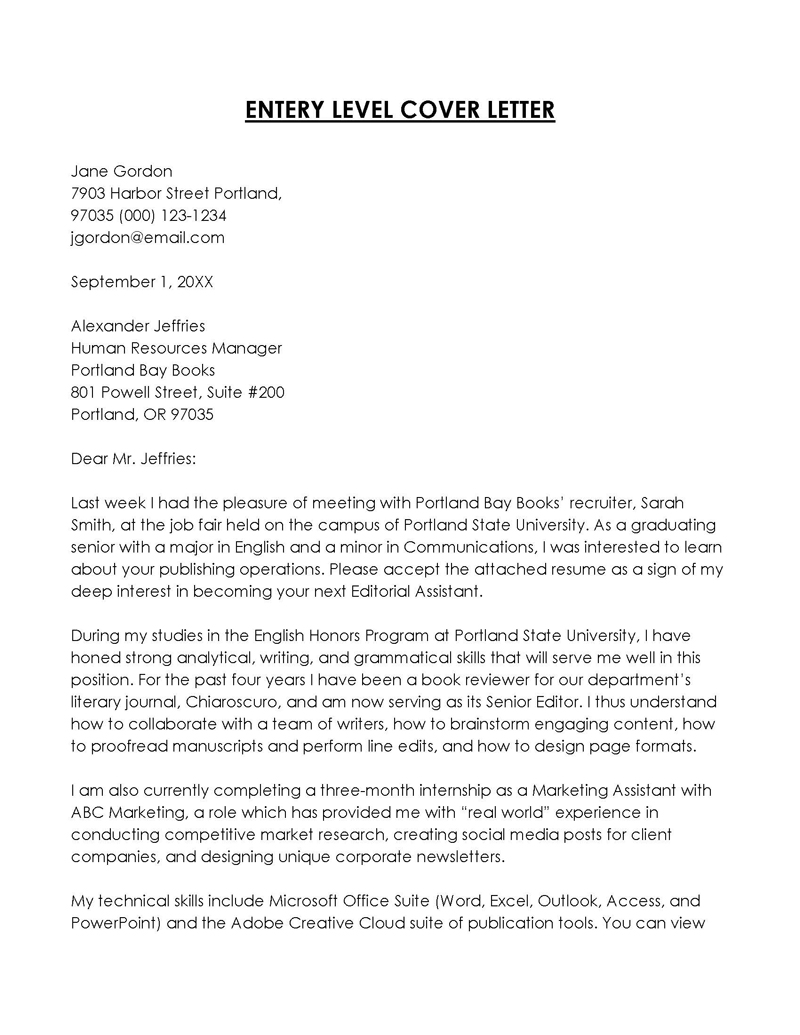
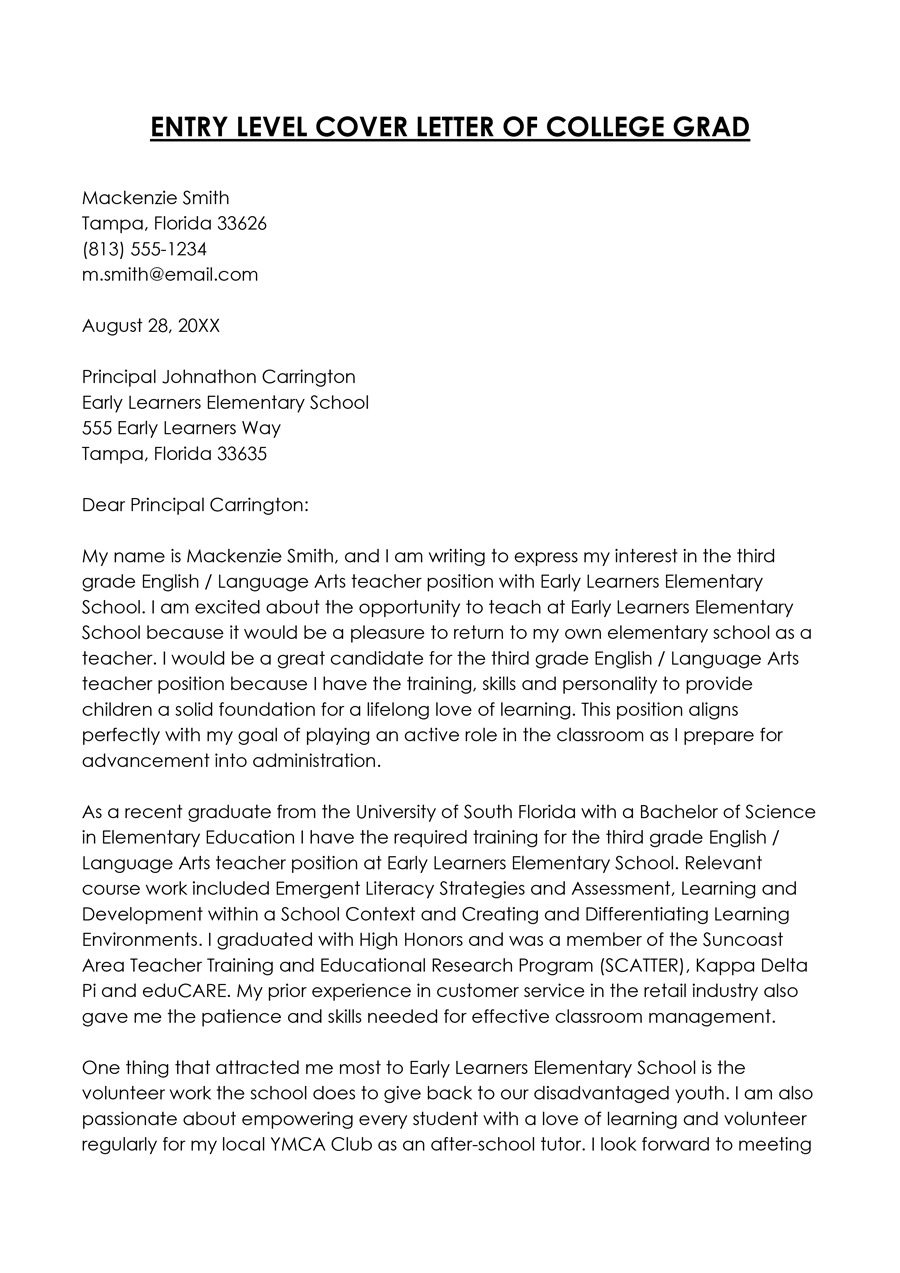
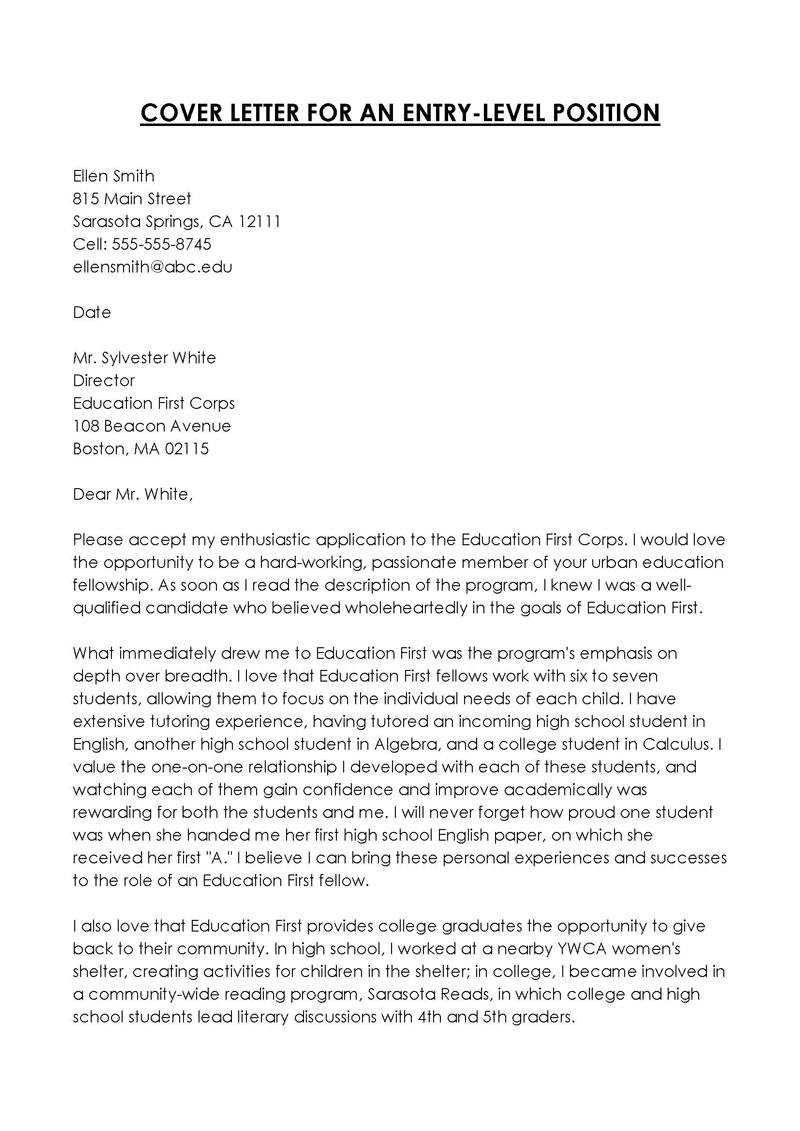
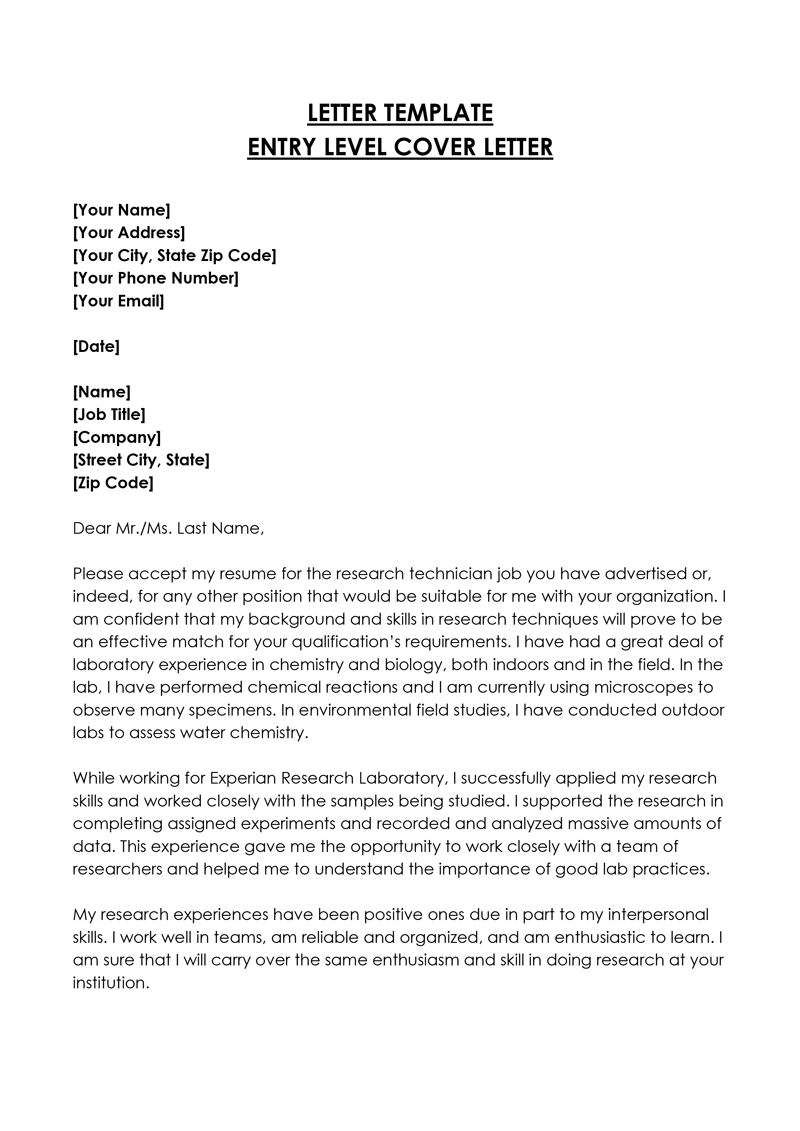
Format of the Cover Letter
An effective cover letter should be written following the standard business letter format, using a large font size and easily legible type.
Ensure that you adhere to the following standard format for it:
The header information contains your full name, address, and contact information (your professional email, phone number, and LinkedIn profile if you have one). Underneath your identifying information and contact information, provide the current date, skip a blank line, and write the recipient’s details. This includes the receiver’s name, title, company name, and the company’s physical address and contact information.
Salutation
After writing your cover letter’s header information accurately, you will want to write and address it to the appropriate individual. Use their name and title, and if possible, avoid generic salutations like “Dear Sir or Madam” or “To whom it may concern.”
Opening statement
Begin your cover letter by writing a brief and concise opening statement that immediately communicates your purpose for writing the letter. Your introductory paragraph should be written in a positive and enthusiastic tone.
The body
The body of your cover letter should be split into two or three paragraphs, with each paragraph focusing on a different topic. The letter’s body should explain your qualifications, skills, and accomplishments.
Closing paragraph
End the cover letter by writing a professional closing paragraph that reiterates your interest in the position. The letter should be closed by thanking the employer for their time and consideration.
Formal sign off
The last item to provide in your cover letter is a formal sign-off, such as “best regards,” “kind regards,” or “sincerely,” and then include your written signature.
How do I Write it?
Consider doing some background research on the business and reading the job description before you start writing the cover letter so you can tailor it to the particular employer and position.
Then, to help you write a compelling letter, refer to the writing tips below:
Step 1: Address the letter correctly
Knowing how to address your cover letter adequately is the first step toward writing a cover letter that lets you get noticed by your prospective employer and increases your chances of getting this position. Typically, the cover letter should be addressed directly to the hiring manager/employer using their correct title and last name. However, sometimes you may not know to whom to address the letter directly.
In such cases, generic but professional salutations such as “Dear Sir/Madam,” “Dear Hiring Manager,” or “Dear Human Resource Manager” are acceptable.
However, refrain from using generic salutations such as “To Whom It May Concern” because some employers may consider them too old-fashioned, causing them to disregard your application.
Step 2: Write a professional and robust opening
The opening paragraph of the cover letter, which the hiring manager or employer typically reads first, should be written to capture their interest. It would be best to begin by introducing yourself correctly, identifying the job title you are applying for, and expressing your interest in the position and company.
If you have any contacts at the job or were referred by a person who works there, be sure to mention them in the cover letter’s opening paragraph, as doing so adds a personal touch to your letter.
EXAMPLE
I am writing to apply for the entry-level position of Office Manager at your company advertised in The People’s Daily Newspaper. I am interested in this opportunity because it aligns perfectly with my career goals and is an excellent fit for my skill set. Ever since I joined university, I have always wanted to work in a multinational company like yours, where I can learn a lot about business and have the opportunity to interact with highly qualified colleagues from different cultures and throughout the world. Furthermore, as an organized and responsible person with solid leadership skills, I am sure that I can contribute effectively to your team and help you achieve your goals and objectives in the office.
Step 3: Highlight your education
Education is crucial for most entry-level jobs and hiring managers will generally look for applicants who are well qualified academically. Therefore, you need to detail your academic qualifications in your cover letter’s first body paragraph, along with highlights of your extracurricular activities, volunteer work, and other milestones you achieved in your previous educational establishments.
However, do not list every single award or qualification you have received; only include relevant ones to the role you are seeking to fill.
EXAMPLE
I am a recent graduate from Beijing University with a bachelor’s degree in business administration, specializing in marketing. During my university years, I participated in several business-related extracurricular activities, such as fundraising for the city orphanage and working as an advisor to the student union. I have also won several awards for my leadership skills and academic performance, including being named the most outstanding marketing student in my class.
Step 4: Include relevant skills
In your cover letter, you need to present a list of your relevant skills and explain how these skills will help you perform well on the job. It would be best if you also tried to incorporate the use of action verbs such as “implemented” and ‘developed” while writing your fundamental skills to emphasize how they were acquired. In addition, you must demonstrate your eagerness to learn other skills.
Typical examples of transferable skills to include in a cover letter for this position include communication skills, analytical skills, research skills, presentation skills, active listening, facilitation, prioritization, attention to detail, interpersonal skills, time management skills, etc.
EXAMPLE
I am confident that I am a great candidate for this position, as I possess all the skills you are looking for in an Office Manager. I have experience in office work, as I was previously employed as a Junior Marketing Manager Intern at Weibo.com, one of China’s most popular social networking websites. I’m familiar with the duties of an Office Manager, from organizing office supplies and filing documents to handling letters and emails. I am also organized and highly efficient, which are vital qualities. I pride myself on my attentiveness and ability to work independently without supervision.
Step 5: Quantify achievements
You should also include the results of your previous achievements and point out how they would benefit the company if you were to get hired in your cover letter. It is good practice to quantify your achievements in numbers, as it provides strong evidence of your capabilities as a candidate for the job. If you cannot provide numbers, you can include projects you have been involved in that will demonstrate your capabilities.
EXAMPLE
I have been consistently recognized for handling challenges and working under pressure. During my internship, I was asked by the CEO to handle the launch of Weibo’s new video-uploading feature. The new feature faced many technical hurdles, which had to be solved by my team. It was quite a challenging task, but we completed it and saw the feature build to the 80% number of daily uploads that Weibo currently sees
Step 6: Express your interest in the company
It is also vital that you show your interest in the company. This will give the hiring manager a better idea of your enthusiasm for the role and the company. Thorough prior research into the company’s history, goals, products, and challenges will enable you to write this section effectively.
EXAMPLE
I’m interested in your company, as I am closely connected to it. In addition, my role model, Mrs. Rose Dolly Adams, who works for this company as a Marketing Director, has always spoken highly of the culture and business practices of the company. I would love to join such a progressive organization, as I believe it would allow me to hone my skills, grow my knowledge, and pursue my career goals further.
Step 7: End with a call to action
Knowing how to end your cover letter properly is essential if you want to leave a lasting impression on the hiring manager. Make sure you end your letter with a call to action statement and state how you want to be contacted. You can also mention that you will follow up with the hiring manager to demonstrate your seriousness about the entry-level position.
EXAMPLE
I’d be honored to personally meet with you to learn more about the entry-level role at your company. I have enclosed a copy of my CV for your review and consideration. In addition, I am available at your convenience to discuss my qualifications for this position. You can contact me via my mobile phone number, 0123456789 or by email at jeniferparker@email.com.
Thank you for reviewing this application.
Samples of Cover Letter
A collection of free cover letter samples tailored for entry-level positions is provided below, with practical examples to help you structure a compelling application.
Sample Cover Letter 1
Dear Hiring Manager,
I am writing to express my interest in the entry-level position at Bright Future Tech as advertised on your company website. As a recent graduate with a Bachelor’s degree in Information Technology from Riverdale University, I am eager to apply my academic knowledge and passion for technology in a practical setting.
During my studies, I completed a six-month internship at Tech Innovations Inc., where I was part of a team that developed a mobile application for efficient task management. This experience honed my skills in coding, collaboration, and problem-solving. Additionally, my final year project, which focused on developing a user-friendly interface for data analytics, was awarded the best project in my class.
I am particularly attracted to Bright Future Tech because of your commitment to pioneering innovative solutions in technology. Your recent project on AI-driven environmental solutions resonates with my interest in sustainable technology. I am confident that my technical skills, coupled with my enthusiasm for tech-driven change, make me a suitable candidate for this role.
Thank you for considering my application. I am looking forward to the opportunity to discuss how I can contribute to the ongoing success of Bright Future Tech. Please feel free to contact me at any time to schedule an interview.
Sincerely,
Jane Doe
Sample Cover Letter 2
Dear Hiring Manager,
I am excited to submit my application for the entry-level position at Green Earth Landscaping, as advertised on LinkedIn. With a recent degree in Landscape Architecture from Sunnydale College and a deep passion for sustainable outdoor design, I am enthusiastic about the opportunity to contribute to your team.
In my academic projects, I focused extensively on sustainable landscaping practices, including my thesis on water-efficient garden designs in urban spaces. This work not only sharpened my design and planning skills but also deepened my understanding of ecological considerations in landscaping. Additionally, I had the privilege of interning with CityScape Designers, where I assisted in designing public parks with an emphasis on native plant species.
Your company’s reputation for innovative and eco-friendly landscape designs is what draws me to this opportunity. I am particularly impressed with your recent project on urban green spaces, which aligns with my vision of integrating nature into everyday urban environments. I am eager to bring my knowledge of sustainable design principles and my creative approach to your dynamic team.
I am looking forward to the possibility of discussing my application with you in more detail. Please feel free to contact me at your earliest convenience to arrange an interview.
Warm regards,
John Smith
Analysis
Individuals seeking guidance on writing professional entry-level job applications will find the sample cover letters provided to be effective examples. They adhere to the essential components of a professional cover letter, making them useful samples.
Firstly, each letter begins with a formal salutation, addressing the hiring manager directly. This establishes a professional tone from the outset. The introductory paragraph in each letter states the purpose of the letter and mentions where the job advertisement was found, demonstrating the applicant’s attention to detail and specific interest in the position.
The body of the letters is well-structured and divided into two paragraphs, which is a common and effective format. In the first body paragraph, the applicants discuss their educational background and relevant experience. This includes specifics such as the degree obtained, the university attended, and details about internships and projects. Such specifics provide concrete evidence of their qualifications and readiness for the job.
The second body paragraph aligns the applicant’s skills and interests with the company’s values and projects. This demonstrates that the applicants have researched the company and understand its mission, indicating a genuine interest in the company beyond just the job opening. This alignment between the applicant’s aspirations and the company’s goals is crucial in making the application stand out.
Finally, the concluding paragraph of each letter is a call to action, inviting the hiring manager to schedule an interview. It also expresses gratitude for considering the application, which is a polite and professional way to end a cover letter.
Overall, these letters exemplify clarity, relevance, professionalism, and personalization—key elements of an effective cover letter. They provide a clear structure that can be adapted to different roles and industries, making them useful guides for anyone uncertain about how to start writing their cover letter.
Important Considerations
When writing a cover letter, there are certain things you can do to make it more compelling for the readers and enable you to stand out from the rest of the applicants.
Here are some essential things to consider:
Do some research
Conducting some research before writing a cover letter for a job is very important. First, obtain adequate information about the company, including its values, mission, goals, the products or services it offers, and its current challenges. Afterward, read their job description carefully and find out the exact qualities and qualifications they are looking for in an ideal candidate.
You should then use this valuable information to write a cover letter that focuses on the company’s needs and expectations and addresses the specifics of the job position.
Check the length
These jobs are usually for people just starting in their careers. As such, the cover letter should be concise and straightforward. It should not go beyond a single page in length, and it shouldn’t be complicated, as this would make it harder for the reader to understand your value propositions.
Proofread
Proofread your letter thoroughly to ensure that it is free of typos and grammatical errors. Poor spelling and grammar mistakes may result in the reader disregarding your application entirely, as they will see you as a non-serious applicant. Therefore, you should also consider having another person read your letter before submitting it to ensure there are no grammatical errors, spelling mistakes, or typing mistakes.
Key Takeaways
A cover letter is an essential document to have when applying for an entry-level position. The letter complements your resume, and it is essentially your main chance to impress potential employers and make them want to hire you. You should use your cover letter to showcase the value you will be bringing to the organization if you can work for the given company. It would be best if you also focused on the specific details of the job listing and addressed both the company’s needs and expectations.
One proven way to tailor your letter to the needs and demands of the job and the company is by conducting prior research into the company. While writing your cover letter for this position, ensure that you are specific, clear, and concise, and make it easy for employers to see why they should hire you. Lastly, use your letter to tell a compelling story that sells your skills and experience and showcases your great personality. This way, you are better positioned to get hired because the employer will want to interview you for the position.












